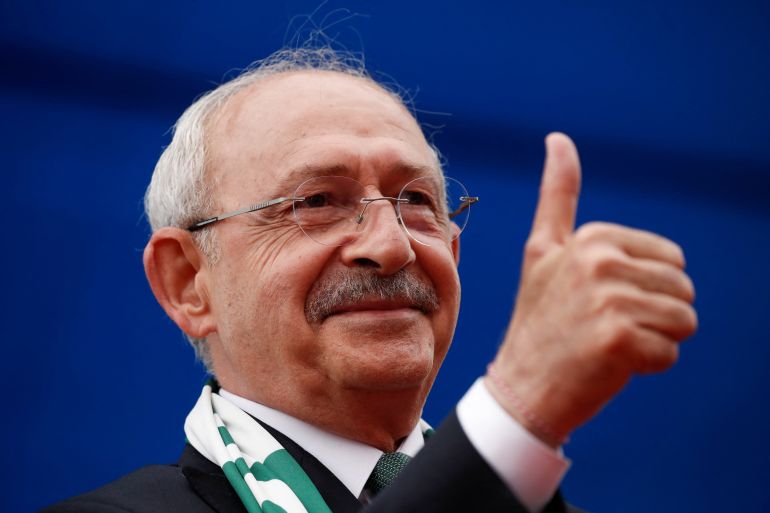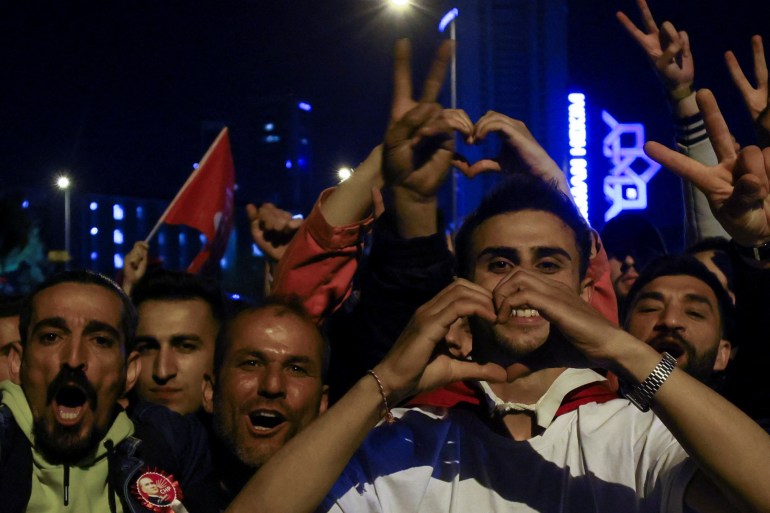Five ways Kilicdaroglu will try to beat Erdogan in Turkey run-off
The opposition candidate has adopted a harder tone while campaigning ahead of the May 28 run-off vote.

Published On 22 May 2023
After a dispiriting first-round vote for many of his supporters, Turkey’s opposition candidate Kemal Kilicdaroglu is heading a steelier campaign to beat his rival Turkish President Recep Tayyip Erdogan in the country’s May 28 run-off election.
But will it be enough?
Here are five strategies the bespectacled former bureaucrat is using to unseat his opponent:
1. Doubling down on anti-migration stance
- Kilicdaroglu’s campaign promise always included the return of Syrian refugees, but his stance has hardened after the first-round vote on May 14 to appeal to nationalists, analysts say.
- Before the vote, he said he would repatriate Syrians on a voluntary basis within two years.
- On the campaign trail, he had also said he would seek European Union funding to build homes, schools, hospitals and other amenities in Syria and would encourage Turkish entrepreneurs to open factories and businesses to create employment.
- But following the May 14 vote, Kilicdaroglu accused the government of allowing 10 million “irregular” migrants to enter the country in a speech on May 17.
- Kilicdaroglu warned the number of migrants could go up to 30 million, providing no evidence for the figures he cited.
- A day later, Kilicdaroglu went further, saying Erdogan “did not protect [Turkey’s] borders and honour” and that he will “send all refugees home. Period”.
- Billboards have since cropped up in Turkish cities showing a smiling Kilicdaroglu next to the slogan “Syrians will leave!”
- While Kilicdaroglu’s Republican People’s Party (CHP) has not advertised the slogan itself, it has not distanced itself from it, either.
Kilicdaroglu’s new political campaign sign:
SYRIANS WILL LEAVE!
“will leave” is syllabised for emphasis. pic.twitter.com/tisVef0qOF
— Ismailoğlu (@IsmailogluF) May 20, 2023
2. Adopting a change of image
- Kilicdaroglu’s mild-mannered demeanour emerged as an antithesis to Erdogan’s bombastic style.
- During the campaign, he played on his more homely image, filming Twitter videos from his kitchen or study in Ankara, his shirtsleeves rolled up.
- An emblem of his campaign was a heart sign formed with hands, a gesture his supporters made at his rallies.
- Since faring worse than Erdogan in the first-round vote, however, he has shifted from his “grandfather” image to one that evokes him being a “tough leader”, notably with his Syrian refugee stance.
- Kilicdaroglu also accused Erdogan of colluding with “terrorists” in his May 18 address, after Erdogan received the backing of the country’s pro-Kurdish party, the Kurdistan Workers’ Party (PKK).
- The collusion reference was about peace efforts made between Erdogan’s government and the PKK, which collapsed in 2015.
- Kilicdaroglu said, “I have never sat down with terrorist organisations, and I will never do”, referring to the PKK.

3. Getting a notable Erdogan rival to spearhead campaigning
- Local media reported that the influential Istanbul Mayor Ekrem Imamoglu is leading Kilicdaroglu’s pre-run-off vote campaign.
- The popular politician was seen as Erdogan’s potential rival in the May 2023 elections; many wanted him to be the CHP’s presidential candidate over Kilicdaroglu.
- Imamoglu was elected mayor in March 2019, a blow to Erdogan and his Justice and Development Party (AK Party), which had controlled Istanbul for a quarter century.
- The notable mayor may have been tapped to now usurp Erdogan’s 20-year rule of the country.
4. Contesting election ballots
- After the first-round vote, opposition parties in Turkey reported thousands of discrepancies and ballot irregularities.
- The discrepancies, they said, were between those recorded at polling stations and the votes entered into the system of the Supreme Election Council (YSK).
- Muharrem Erkek, a CHP deputy chairman, claimed votes for Kilicdaroglu had been incorrectly allocated to Muharrem Ince, who pulled out of the presidential race three days before the election.
- Erkek said extra votes were also given to Erdogan, but did not provide evidence.
- He vowed to follow “every single vote”, suggesting the party will be monitoring irregularities from the May 28 run-off.
5. Re-energising his voter base
- Shortly after the outcome of the May 14 vote became apparent, Kilicdaroglu told his supporters, “Don’t despair. We will stand up and take this election together.”
- “We will definitely win this election in the second round. Everyone will see it,” he also said.
- Kilicdaroglu managed to rally Turks of different stripes into an alliance that spans nationalists, Islamists, secularists and liberals, a voter base he will have to continue to appeal to, despite many having become despondent after the first-round vote.
- Some of his supporters aren’t turned off by his more hardline anti-migrant stance, recently disparaging an AK Party official for having a softer approach, indicating continued support from his followers.
Source: Al Jazeera and news agencies